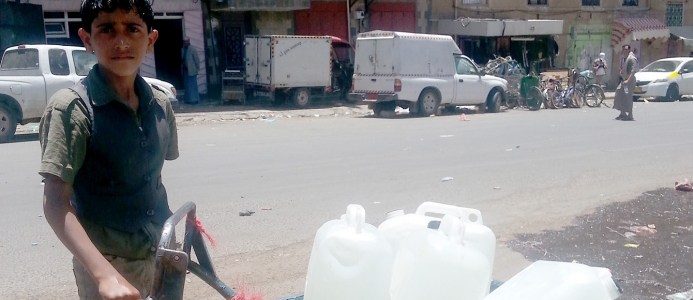
’The Struggle for Survival Intensifies as the Conflict Rages On’- ec.europa.eu
In recent months clashes broke out in the Yemeni capital, Sana’a - some of the most serious violence seen there in recent years. It followed weeks of anti-government protests, partly in response to unpopular fuel prices... A UN-brokered peace deal called for the appointment of a new neutral head of government... However, there is still political stalemate and violence is ongoing in many parts of the country.
Daniela D’Urso is the former head of the Yemen office of the European Commission’s Humanitarian Aid and Civil Protection department (ECHO). In this post, she reflects on the latest upheavals and what they mean for the work of humanitarian agencies.
The corners of any city have faces, memories, stories to tell. I lived in Sana’a for three years and learned to recognise many of its corners. But today, more than five months into the conflict, Sana’a looks different.
After months of continuous airstrikes, the city of Sana’a, like many other areas in Yemen, is on its knees. Streets are empty, many shops have shut down and signs of destruction are visible everywhere. The loud voices of children in the kindergarten outside my bedroom window are no longer there as children have stopped going to school. The neighbours have left the area: some moved to the neighbouring villages, searching for what they think will be a safer refuge, for water, for food. Some others have moved in with families and relatives, waiting for the worst to happen. Many others have left the country, risking their lives in small boats to Djibouti or Somalia.
I met Sarah while visiting one of the schools in Sana’a; she is one of the many Yemenis who fled their homes in search of a safer place. This tiny woman dressed in a dusty black gown now lives in a school in the outskirts of the city. When Sa’ada, her hometown, was declared a military target by the Saudi-led coalition, she took the road with her husband and two little girls and arrived in the capital. She first moved in with relatives but food and water were not enough for everybody. She knew of a school hosting other families who had a similar fate. The school now hosts 30 families sleeping on flat mattresses inside the classrooms, living on in-kind food donations of generous neighbours; a nurse volunteers to offer assistance three times a week but medicines are not available or insufficient. Other schools in Sana’a have also received families fleeing from war, but many other people are displaced across the country, some with no choice but to stay in the open.
Basic food and water are also difficult to get, electricity comes for 30-40 minutes every day. Since the start of the conflict in fact the country has been under a naval and air embargo that impedes the commercial shipping to unload in Yemen. The country imports 90% of its basic requirements in food, fuel and vital medicines. The full blockade on oil imports is the one impacting people’s lives the most and has forced the country into a dismal reality: due to acute shortage of fuel, many companies have shut down, leaving thousands of people unemployed; many food processing and milling factories cannot operate; water pumps have stopped in many cities; hospitals have to shut down as fuel and vital medicines are no longer sufficient to operate, and chronic patients cannot be hospitalised or receive adequate treatment.
Many people are selling their assets, buying on credit, taking children out of school to provide for the house, queueing for days at petrol and gas stations for a few litres of fuel to run small generators for an hour of light, to cook what has become the only meal of the day. Yemen was already the poorest country in the region: the escalating conflict has worsened an already large scale humanitarian crisis in Yemen. The blockade, the ongoing heavy fighting in the southern regions, and the airstrikes are all affecting the entire country, with its highest devastation on the life of the average citizen. Since the beginning of the conflict more than 2 000 civilians, including children, have lost their lives and over 1 million people are displaced.
This war has become the war of the ordinary Yemenis and their struggle to survive as the battle intensifies over ever scarcer resources: at bakeries or petrol stations people fight, sometimes kill, out of hunger and frustration. This war has become the war of the Yemeni children denied of their right to play and go to school. It has become the war of many more who keep keys of houses they will no longer go back to and that now are living on the mercy of those who can still assist.
Like many others, Sarah is worried for her children, their future. But their future, she says, is tonight, is tomorrow. We have left our house but we are still not safe as the attacks continue night and day on Sana’a. But there is no safer place, today, in Yemen.
